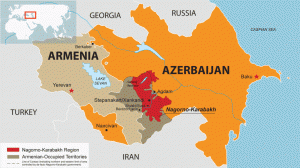 Azerbaijan’s breakaway Nagorno-Karabakh region voted in a referendum to change the presidential powers on February 20. The separatist Nagorno-Karabakh region has strengthened the leader’s powers in a referendum that international observers warned was illegal.
Azerbaijan’s breakaway Nagorno-Karabakh region voted in a referendum to change the presidential powers on February 20. The separatist Nagorno-Karabakh region has strengthened the leader’s powers in a referendum that international observers warned was illegal.
The Nagorno-Karabakh conflict is a territorial and ethnic conflict between Armenia and Azerbaijan over the Nagorno-Karabakh region, which by de-facto, is Armenian-controlled by the self-declared Nagorno-Karabakh regime. Yet, it is internationally recognized as an inseparable part of Azerbaijan.
The conflict has its origins in the early 20th century, although the present conflict began in 1988 and escalated into a full-scale war by Armenia-backed separatists against Azerbaijan in the early 1990s. Tensions and border skirmishes have continued in the region and an official ceasefire was signed in 1994.
In 1993, the United Nations Security Council accepted four resolutions (822, 853, 874 and 884) on the Nagorno-Karabakh conflict demanding the complete withdrawal of Armenian forces from the occupied territories.
Today, Armenia pushes this region to have an independent state and put efforts internationally to promote this separatist regime in the Western countries. Thus, a referendum was held to strengthen the administration structures. Nagorno-Karabakh will have no prime minister, and the elected president will appoint the ministers.
Central Electoral Commission (CEC) of the separatist regime has provided the final data on the results of voting at the Constitutional Referendum. According to the CEC, 87,55 % of the people voted in favor of constitutional reform and changing the regime’s name.
The region’s original name “Karabakh” etymologically belongs to the Turkish language, which means “Black Garden”. Since the Armenian occupation, of more than 25 years, this name was used even by the separatist regime. Finally, Armenians voted to change this name into an Armenian word of Artsakh.
Ashot Gulyan, the speaker of the separatist Nagorno-Karabakh National Assembly said, “This means that the subject is changed in the Constitution, and our wish, which has voiced repeatedly, of returning to our historical and genuine name, will be reflected already in the first article,” Arka Agency reported.
Azerbaijani President Ilham Aliyev and international mediators to the Karabakh conflict have denounced the referendum as illegal. “The referendum is illegal and by holding it the Armenian side proves once again that it is not interested in the settlement of the Karabakh conflict,” Aliyev said, AFP reported.
Here, some questions arise about a possible pro-active Armenian policy on Nagorno-Karabakh issue. Still, Armenia doesn’t recognize Nagorno-Karabakh as an independent state. There are several reasons explained by Armenian politicians that Armenia doesn’t want to appear as an aggressor side in the conflict. Another reason is that Armenia wants to keep this area as an additional part of the country, not an independent one.
“If Armenia recognizes the Nagorno-Karabakh Republic, the two Armenian states will be able to embark on a unification plan sometime in the near future,” said Giro Manoyan, the political affairs director at the ARF-D (Armenian Revolutionary Federation-Dashnaktsutyun) Bureau to Tert agency. He added, “If Armenia recognizes the region’s independence, the Republics of Armenia and Artsakh (Karabakh) may later decide themselves whether to unify [into a single country].”
For following this way, Armenia should be careful with the political and legal processes. Sudden decisions to change the name of the separatist regime after long-scale clashes since 2016 are showing the upcoming radical decisions of Armenia.
The recent talks of the Serzh Sargsyan, President of Armenia with NATO and EU officials show other instruments of the new Armenian policy. In Sargsyan’s meeting with General Jens Stoltenberg, the NATO Secretary General, he said, “The April war, followed by continuous regular shootings with the use of heavy artillery and military equipment demonstrate that this conflict is an “active” one. Today more than ever, it is essential that the international community unites around a civilized settlement by supporting the efforts of the OSCE Minsk Group Co-Chairs countries towards the peaceful settlement.”
In another meeting with Donald Tusk, President of the European Council, he mentioned the conflict again, “Naturally, during the talks, we touched upon the Nagorno-Karabakh conflict and reaffirmed that it has no military solution. Even though the Armenian side is ready for reasonable mutual compromises, the issue is based on the rights of the people of Artsakh (Nagorno-Karabakh) to determine its future through free expression of will. There can be no other approach. The rights of the people of Nagorno-Karabakh to self-determination are not only enshrined in international fundamental documents, it is also recognized and embodied in numerous statements of the OSCE Minsk Group Co-Chairs – the only specialized structure dealing with this conflict.”
From the perspective of Armenia, a peaceful solution of Nagorno-Karabakh conflict is impossible. Armenia will not accept the return of one million Azerbaijani deported populations and the unification of Nagorno-Karabakh to Azerbaijan. Still, there is hesitance to recognize here as an independent state but the internal conflict of Armenian politics does not permit this. Today, it seems that Armenia will continue a global campaign on the promotion of Nagorno-Karabakh’s new name and new legal system. As Giro Manoyan said, there can be a step-by-step process of recognition and unification.
Mehmet Fatih OZTARSU

 Nisan 17th, 2017
Nisan 17th, 2017  oztarsu
oztarsu  Posted in
Posted in  Tags:
Tags: